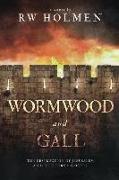- Start
- Wormwood and Gall: The Destruction of Jerusalem and the First Gospel
Wormwood and Gall: The Destruction of Jerusalem and the First Gospel
Angebote / Angebote:
On a late summer's day during the reign of Emperor Vespasian, the world seemingly ended for the Hebrew people of Palestine, tens of thousands died as Roman legions torched Jerusalem and demolished the Holy Temple, the very dwelling place of the Lord God Almighty of Israel. As blood-swollen gutters ran red and the smoke of hellfire blackened the sky, where was God? Was there meaning to life? To death?After nearly a century of restless churning under the oppressive Roman Empire. Zealot revolutionaries took up arms against the vaunted Roman legions, initial successes chased the Romans from Palestine but unleashed internal power struggles and bloodletting of the priestly aristocracy that was believed to be sympathetic to Rome. When the vengeful Roman legions returned, they swept through the Galilee, leaving cities and villages ablaze and the countryside littered with rotting corpses on crosses. Refugees swelled Jerusalem like goats herded to the slaughter pens.In the spring of 70 CE, the legions set upon Jerusalem and raised their siege engines and ramparts and launched their catapults. As the summer sun spiked hot, the city's defenses weakened, and before autumn arrived, the temple fell on the 9th day of the Hebrew month of Av. Months after the killing and dying finally ceased, winter rains doused the smoldering ruins and washed the blood and ash from sole wall remaining from God's magnificent marble temple.The Great Roman-Jewish War was a watershed moment--no, more than that, an apocalypse in which the end of the world seemed near--not only for the Hebrew people, but also for emerging Christianity, and "Wormwood and Gall" remembers this oft-forgotten setting for an early, important chapter in the history of the church. Amid death and destruction, the dispirited remnant of the followers of Jesus, who had been awaiting the return of their crucified messiah for four decades, needed encouragement and words of hope. In response, an unknown person compiled the good news narrative that has come to be known as "the Gospel according to Mark." This first gospel served as template and principal source document used by the later compilers of the gospels of Matthew and Luke. John, the fourth canonical gospel, came later still from a different stream of tradition. Although a scholarly consensus agrees with this context and chronology for the development of the gospel tradition, not much more is known about the individuals behind the gospels."Wormwood and Gall" is a fictionalized account of the birth pangs of the early church against the background of revolution, civil war, and apocalyptic devastation. This novel's characterization of the gospel's compiler is entirely fictional as history remembers virtually nothing about the actual person behind the gospel compilation--not even his real name. The gospel document does not identify its author. The terminology "the Gospel according to Mark" dates to a 2nd century identification of an associate of Peter, but current scholarship doubts that association. However, for the sake of consistency and familiarity, the novel's principal character shall be named Markos, the Greek form of "Mark".Scholars have long looked to the "setting in life" as the starting point in analyzing ancient Biblical manuscripts. Although Wormwood and Gall fictionalizes the characters behind the compilation of this gospel, the novel attempts to accurately recreate the events, chronology, and apocalyptic milieu of the Great Roman-Jewish War as the setting that influenced the formation of the first canonical gospel, which in turn influenced the later gospels.
Fremdlagertitel. Lieferzeit unbestimmt
